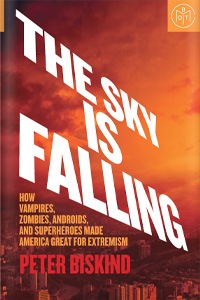

Social sciences
The Sky Is Falling
by Peter Biskind
Save $ with BOTM.
Quick take
An entertaining and insightful look at the ways film and television can shape political thought.
Synopsis
Almost everything has been invoked to account for Trump’s victory and the rise of the alt-right, from job loss to racism to demography—everything, that is, except popular culture. In The Sky Is Falling, best-selling cultural journalist Peter Biskind dives headlong into two decades of popular culture—from superhero franchises such as the Dark Knight, X-Men, and the Avengers and series like The Walking Dead and Game of Thrones to thrillers like Homeland and 24—and emerges to argue that these shows are saturated with the values that are currently animating our extreme politics.
Where once centrist institutions and their agents—cops and docs, soldiers and scientists, as well as educators, politicians, and “experts” of every stripe—were glorified by mainstream Hollywood, the heroes of today’s movies and TV, whether far right or far left, have overthrown this quaint ideological consensus. Many of our shows dramatize extreme circumstances—an apocalypse of one sort or another—that require extreme behavior to deal with, behavior such as revenge, torture, lying, and even the vigilante violence traditionally discouraged in mainstream entertainment.
In this bold, provocative, and witty investigation, Biskind shows how extreme culture now calls the shots. It has become, in effect, the new mainstream.
Read a sample
Get an early look from the first pages of The Sky Is Falling.
Why I love it
Maris Kreizman
Author, Slaughterhouse 90210
There’s nothing better than unplugging from the news and getting lost in entertainment that has nothing to do with politics. Or so I thought, until I read Peter Biskind’s latest book of cultural criticism. It turns out that everything we might think of as mind candy—from superhero movies to horror flicks, from Game of Thrones to The Walking Dead—may mirror our ideologies more than we think.
Through the lens of films and TV shows, Biskind delineates the rise of extremism on both sides of the aisle. He proposes different ways in which entertainment reflects conservative or liberal values—for example, sci-fi movies that lean toward the right often portray aliens as hostile invaders while more liberal renderings are more likely to paint them in a more positive light.
Biskand’s command of film and television is far-reaching, and while you may not agree with all of his conclusions, you’ll find compelling arguments for how and why we got here. A scrupulous book about the intersection of politics and entertainment, The Sky is Falling made me reconsider what it means to get lost in other art forms.





